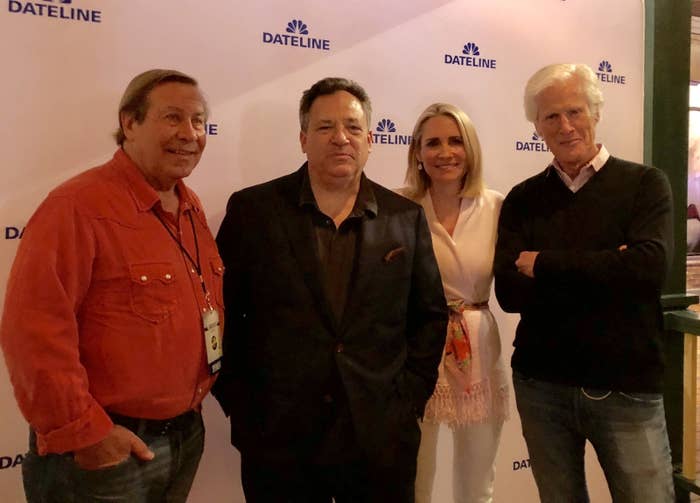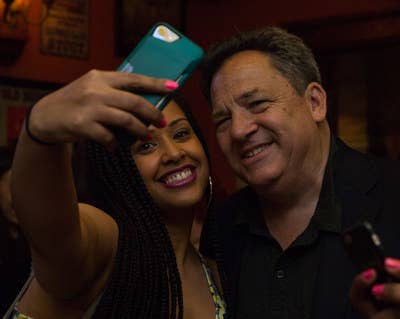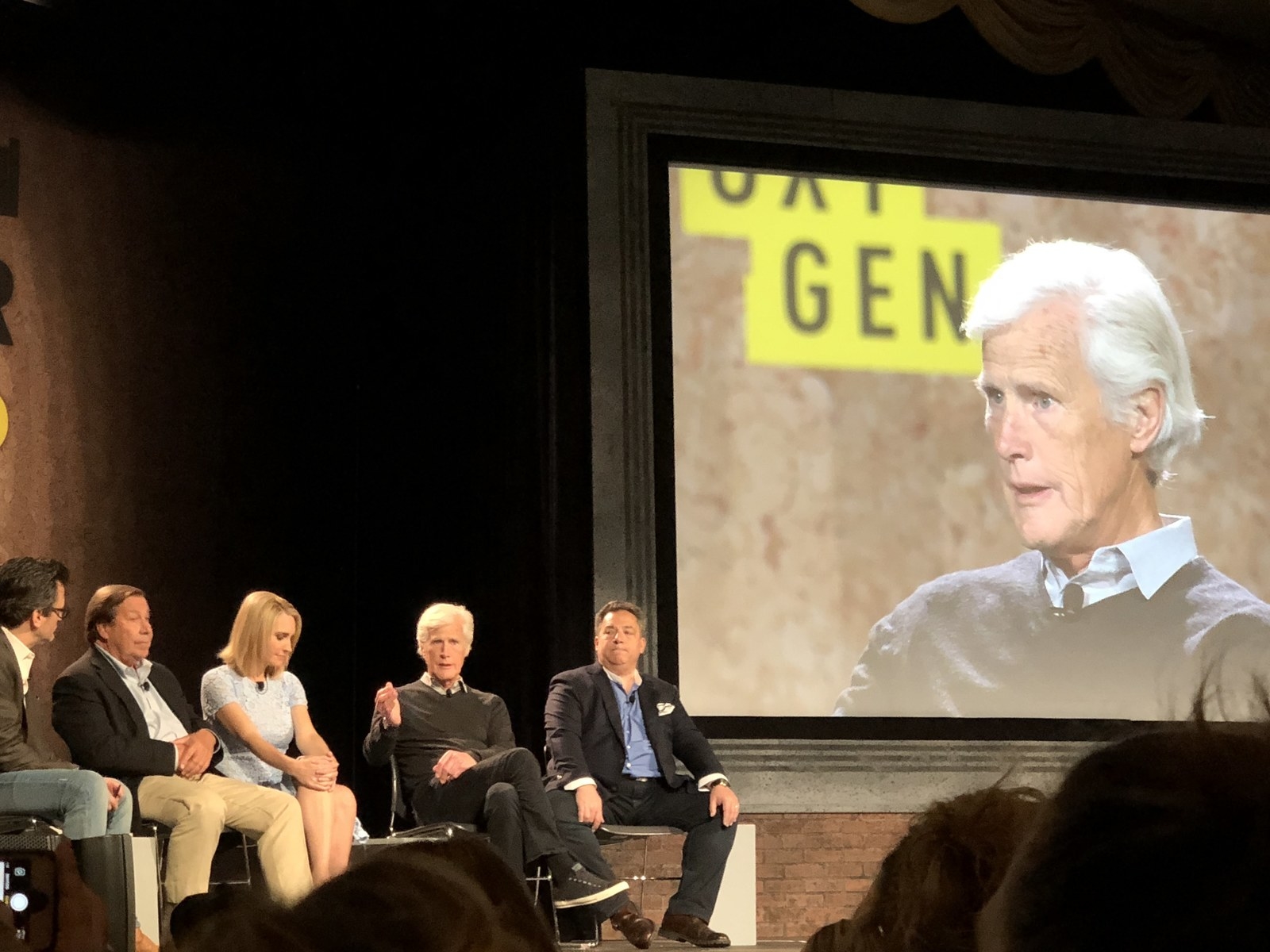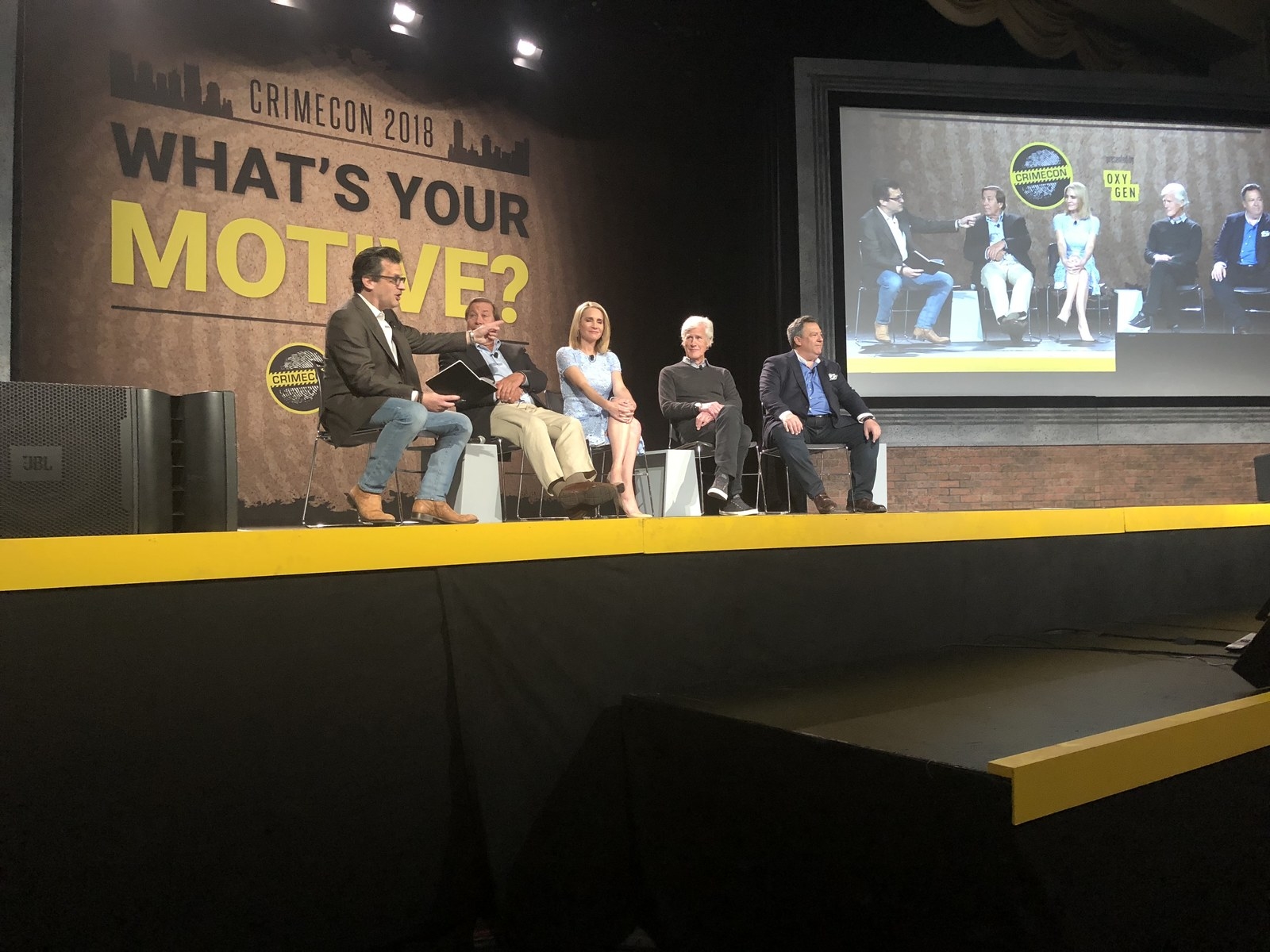
When Dateline’s four correspondents took the stage at CrimeCon — a thing that exists, like FOMO, which you are totally feeling right now, admit it — the 2,000 people that packed a Nashville ballroom to see them went wild. And when Keith Morrison, a goddamn superstar in the world of true crime reporting, first spoke, the audience erupted in laughter.
He wasn’t trying to be funny. It’s just electrifying to hear his lilting, melodious voice — no matter the subject, mundane or macabre.
Morrison and his three cohorts — CrimeCon “mayor” Josh Mankiewicz, bulldog reporter Dennis Murphy, and the fearless Andrea Canning — sat down with BuzzFeed just before they took the stage to talk about their journey to celebrity and the criminal investigations that made them famous.
“It’s his fault we’re here,” Morrison — surprisingly shy given his job and status as a pop culture icon — said, pointing to Mankiewicz.
“I fully acknowledge that this is all my fault,” Mankiewicz said in his own distinctive voice — a droll purr (or a growl, if you’re in shackles and he’s not buying what you’re selling). “I went to CrimeCon last year,” he continued, referencing his solo appearance at the convention’s 2017 debut in Indianapolis, “and I saw the incredible reaction to what we cover and to Dateline specifically.”
“This is a 100% overlap with our audience,” he said he told Dateline executive producer Liz Cole. “I mean, there’s no one here who heard me speak last year and thought, Huh. Dateline? I should check that out. You know? This is the audience here. And I said, ‘We have to come back. And you have to make everyone else go.’”
He turned to Morrison. “So actually, you’re welcome.”
Morrison looked a little pained. While he loves to interact with people one-on-one or on social media, he said, “put me in a big crowd of people, and I want to run!”
“I’m kind of a little shy, ironically, given the business I’m in,” Canning said, “and just coming here I was walking very fast through the crowd. It didn’t stop people from stopping me, and when they do I’m so grateful. And then I feel kind of disarmed and at ease once I start talking to them.”
“This is like the bird on Twitter just came to life,” she said.
“I’m an introvert,” Murphy admitted, but said he had “great fun” meeting a small group of people who’d watched his Dateline episode the night before at an NBC-sponsored event at a nearby pub.

The decidedly not shy Mankiewicz, for whom taking selfies with fans seems to be an automatic reflex, said, “My contact with the audience both at events and events like this and airports and places like that has been 100% positive.” The “great value” of CrimeCon, he said, is meeting the audience face-to-face — “and also seeing how uncomfortable it makes Keith.”
Morrison agreed: “He likes that best.”
But the Dateline correspondents are unanimous in their embrace of what Morrison calls the “big explosion” of social media, its role in the popularity of true crime, and its impact on their reporting.
In a recent Dateline episode, Mankiewicz said, the victim “had lived extensively on social media, so that was part of the story. And in terms of affecting our reporting, there were like a thousand pictures of her. Which, sometimes, when you’re doing these stories, there’s not a lot of video or photos.” (True crime aficionados are all too familiar with the pan-and-zoom effect shows like Dateline use to make old photos — sometimes only a single image — seem more dynamic.)
“We really rely on every citizen with a camera,” Murphy said.
And increasingly, so do the cops. “Sometimes murders are solved just by having the victim’s cellphone,” Canning said. (That holds true for murder suspects as well — including Adnan Syed, the Serial podcast subject whose murder conviction was recently overturned based on cellphone evidence.)
“What is the appeal of what we do?” Murphy, always the reporter, asked his colleagues about the exponential growth of armchair detectives. “Because it seems to be accelerating. We’ve been doing it for years, but it’s still only the last five years — it’s just climbing higher and higher.”
“It’s a cohesion of ideas,” Morrison said. “Social media came along, interest in crime has been growing for years, but the two got together and became combustible. This big explosion. Because everybody can follow it, and everybody can take part in it, and you can have your own podcast if you want to have one.”

“You can play along at home,” Murphy said.
“And there are all these websites where people can try to solve a particular crime,” Morrison said. “The Golden State Killer that just got solved — there was a huge website for years.” (Michelle McNamara, whose book about the serial killer, I’ll Be Gone in the Dark, was published posthumously, actually coined the GSK moniker.)
The Golden State Killer suspect was arrested just days before CrimeCon — where several panels had already been scheduled to discuss the serial rapist and killer. So what unresolved Dateline stories would the correspondents like to see addressed at next year’s true crime convention?
Murphy said he’s “waiting for the shoe to drop” in the murder investigation of Florida State University law professor Dan Markel, whose in-laws are suspected of hiring two men to gun him down in his driveway in 2014. Mankiewicz is anxious to see a break in the case of Missy Bevers, a fitness instructor whose 2016 murder remains unsolved despite extensive surveillance footage of her suspected killer in the church where she was brutally attacked.
“There is one story that I’m anxious to get going,” Canning said: the rearrest of Leslie Jenea Chance, a former elementary school principal in Bakersfield, California, for the 2013 killing of her husband. Since Canning first interviewed Chance, she said, “she’s had gastric bypass, and I’m not eight months pregnant. So it will be really interesting when you see both of us on our next Dateline on this case!” Surveillance footage is also an important part of the prosecution’s case, but Canning pointed out that it’s “too grainy” to identify Chance. “It looks like her, but now she goes up in front of a jury and she weighs 120 pounds — I don’t know if it’s going to have the same punch.”
“You’re always kind of waiting for the next step in the story,” Morrison said.
And when that happens, the correspondents have to be ready to roll.
“I admire Keith’s easy gait,” Murphy said of Morrison. “On my best day, Keith is 50 yards ahead of me, heading for the yellow tape, waving to the crowd, and his day is done — and I’m huffing and puffing behind. This is the gold standard.”
Morrison returned the compliment: “He on the other hand, among all of us, is the reporter in the crowd. And the writer. He comes with credentials we all admire” — including four Emmys for news reporting.
As for Canning, Mankiewicz said, “I saw her hanging off a mountain once. She’s incredibly brave.”
It doesn’t take much to scare a Dateline correspondent.
“You can sit across from a serial killer and interview a really, really scary guy, and that’s nothing to compared to interviewing a brilliant politician,” Morrison said. It’s those types of interviews that make him “nervous as a rat.”
“Nothing on Dateline has scared me the way being on a battlefield did,” Mankiewicz said. “I feared for my safety much more covering Central America and the Mideast than I do at Dateline. We interview a lot of killers, but first of all, they’re almost always shackled. And second, they’re on their best behavior.”
“They’re trying to impress us,” Canning said about the prisoners.
“They’re trying to show us it’s all a big mistake,” Mankiewicz drawled, one eyebrow cocked. “I had a guy start yelling at me in Montana last year. And he was not shackled, either.”
Canning, the only woman correspondent on Dateline, unfortunately has experienced something worse: “I get the other side — I get hit on sometimes by killers, which is always fun,” she said wryly, to the surprise and dismay of her colleagues.

Although the correspondents joked about all the convicted killers who claim to be innocent, it is wrongful convictions that haunt Morrison the most.
“I think a lot about the people we have covered over the years who were falsely convicted of something,” he said, shedding his melodramatic mantle for a moment. “I just saw one of them outside the hallway [Ryan Ferguson, who had just done a CrimeCon panel with 48 Hours correspondent Erin Moriarty], whose story we did. And numbers of others of them — we would do their stories and wait around for years sometimes to see whether or not, perhaps, they would get out. Occasionally they do, but frequently they don’t. And there are innocent people sitting in prison right now and you know, you think about them. I feel really bad.”
Mankiewicz said people often ask him about the worse case he’s ever covered, but he pointed out, “to the people we interview, every case is the worst case.”
That doesn’t mean fans of true crime are unsympathetic to the victims and their families. Morrison has a theory about why the genre has spawned countless podcasts and documentaries, amateur investigations, and now a sold-out convention.
“There is something about the world now… [It is] a world that doesn’t seem that anybody can know how it works. But you know, they can get interested in this kind of thing, and I’m fascinated by it.”
“On Dateline, the world works the way people wish it did," said Mankiewicz.
“The world is sewn back together by the time by the time we roll credits,” Murphy said about Dateline. “At least one part of it.”
